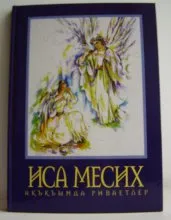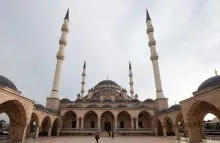
It was an ordinary working day in our IBT office. Two translation teams had come to Moscow for consultations. For both teams it was the final stage of their work. Both Bibles are already fully translated. In one case the Bible is almost ready to be submitted to the publication department, and the last technical details are being discussed. In another case the team is working with the third and fourth drafts of different Bible books. I was intrigued by the similarity of these two situations and I wondered how the translators representing two great people groups, one from the Caucasus and one from the Crimea, feel after their tremendous work. So I asked both translators for a short interview, and my first question was how it happened that they decided to connect their lives with Bible translation.
“When it was first suggested that I should try to translate the Bible text, I felt embarrassed. ‘Why do we need it at all?’ I asked. ‘We have our own religion and that is Islam. I do not need the Bible! And my people have absolutely no need of it!’ That was my firm conviction at that time”, said our Caucasian translator. But he accepted the book out of mere cultural interest and in order to have some further basis for his arguments. That book was the Gospel of Luke. “I went on reading and something in me was turning upside down”, he continued. “Such was the effect of this book that I became a completely different person. I started to translate little by little. Six years passed, and I became a Christian believer, but that is too personal to be told…”

“And have you ever had to make a descriptive sort of translation?” I ask our Caucasian translator. “Yes”, he said, “people of Muslim tradition are not used to the word ‘Messiah’, and we had to translate ‘Christ’ as ‘God’s very specially Blessed One’.

“I have no doubt that the Bible will find its readers. If not immediately, if not now, when the situation in my country is too dangerous for anyone who dares to have his own opinion, then it will happen later in the future. It is bound to happen! God Himself will find readers for it, and it is for Him to decide when and to whom to give it. There is simply no other way round, just because the Bible is unique and it should be a desk book for anyone who is concerned for his spiritual growth”, our Caucasian translator shared the confidence of his heart.
The Crimean translator seemed rather surprised by the very question of finding readers. “The audience for the Bible is ready for a long time already,” he says. “Whoever knows the Crimean Tatar language, be he a Muslim, or a Christian, or an unbeliever, everybody is reading Bible texts eagerly. Our Muslim authorities were against the translation, as they thought that the audience was unprepared, but mere practice proved the opposite. The Bible is universal. I even came to know my own native land better after translating the Bible”.

“I never had any idea that the cedars of Lebanon are typical of the Crimea. I came across the name of this tree for the first time when I was translating the Bible, and then I learned that these very trees are growing in the Crimea. Now I must go to the botanical garden and find out which tree is the cedar of Lebanon. This is my dream”.
IBT Russia/CIS is a non-profit organization financed through contributions from individuals, sponsoring organizations and foundations.
You can donate to IBT:
Through: AO UniCredit Bank, Moscow
SWIFT: IMBKRUMM
In favour of: Institute for Bible Translation
Address: 119334, Russia, Moscow, Andreevskaya nab. 2
TIN (INN) 7736231521
9-digit Bank identification code in Russian banking system: 044525545
Account no. (IBAN):
634261 USD 4020 02 001 or 40703840700010142881
634261 EUR 4020 02 001 or 40703978700010366720
634261 GBP 4020 02 001 or 40703826600010366723
Through: NOSTRO ACCOUNTS OF AO UNICREDIT BANK, MOSCOW:
USD JPMORGAN CHASE BANK N.A., NEW YORK SWIFT CODE: CHASUS33
EUR UNICREDIT BANK AG (HYPOVEREINSBANK) , MUNICH SWIFT CODE: HYVEDEMM
EUR UNICREDIT BANK AUSTRIA AG, VIENNA SWIFT CODE: BKAUATWW
EUR UNICREDIT S.P.A., MILANO SWIFT CODE: UNCRITMM
GBP THE ROYAL BANK OF SCOTLAND PLC, LONDON SWIFT CODE: RBOSGB2L
Important! In the field "designation" write "CHARITY DONATION"
For more information address IBT
You may sign up to receive our Russia/CIS monthly English newsletter here
